Voices of the people
It’s daunting to talk politics these days. But some alumni who are working in local, state, and federal roles remind us why we need not be discouraged.

Aerial panorama of Trenton New Jersey skyline amd state capitol at sunset. Trenton is the capital city of the U.S. state of New Jersey and the county seat of Mercer County.
It’s daunting to talk politics these days. But some alumni who are working in local, state, and federal roles remind us why we need not be discouraged.
It’s a viper’s pit these days. With public trust in government trending at or near all-time lows, and political debate as bitter as ever heard in American history, who in their right mind would go into the public sector?
These 14 TCNJ alums did.
Some have been in it for decades; a few left, but went back; and two started at a time when they weren’t exactly alumni yet.
But while all have had their ideals tested in some way, they remain in government, because as banal as it may sound, they still believe they can make a positive difference in the lives of their fellow citizens.
Or as one put it, “At the end of the day, it’s all that matters.”
Here are their stories.
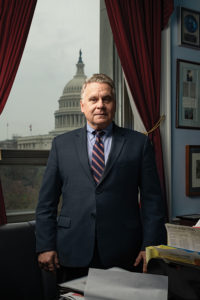
Chris Smith ’75
U.S. House of Representatives
Chris Smith doesn’t recall if he was assigned to defend the “rights of the unborn” or if he chose the topic himself; the issue had not previously been on his radar, he says. But in his public speaking class at Trenton State, the freshman knew he’d struck a chord by the vehemence of the pushback he received from some fellow students.
“That’s where it all started, right there,” Smith says; both the unborn and their mothers were victims who needed advocates, he decided. Before long, he was running a Right to Life campus organization.
Smith had planned to study business administration, with the idea of taking over his parents’ sporting goods business. In addition to his degree, he emerged with a lifelong passion — as well as a girlfriend, Marie, a fellow student who became his wife. By 27, he’d won a seat in Congress, on his second try, in part as an anti-abortion candidate.
Still debated today, the “right to life” has been Smith’s signature issue through four decades on the Hill. But it’s just one of his many efforts to defend society’s “most vulnerable,” he says: veterans, people with autism or Alzheimer’s, victims of human trafficking, and more.
“It is rooted in my faith,” he says. “We need to have their back.”
Frequently “bending into the wind,” Smith champions the rights of people who face persecution all over the world: Muslim Uyghurs in China, victims of genocide at the hands of ISIS in Syria and Iraq. When Russia invaded Ukraine earlier this year, Smith did not hesitate to label Vladimir Putin a “war criminal” and call for his immediate indictment.
He’s one of the House’s most prolific authors of legislation and claims his staff has handled 94,000 constituent cases over the years, helping individuals navigate government. In one of his re-election campaigns, an opponent dismissed him as “an overpaid caseworker.” Smith took it as a compliment. “Casework and policymaking are the two jobs” of congressional members, he says.
Though he is steadfast in his opposition to abortion, Smith is known for crossing the aisle on issues and hopes that the practice makes a comeback. He loathes “deceit, bickering, and mockery” and regards personal attacks as “tragic.” All are far too common in D.C., Smith says. “It is a bipartisan, bicameral process here, and if you can find common ground, you ought to,” he says. People with opposing views “are not the enemy,” he says, and “We need to reclaim that, for the sake of our democracy.”
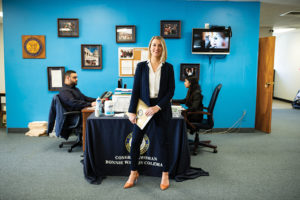
Kari Osmond ’09
Chief of staff, U.S. Congresswoman Bonnie Watson Coleman
Kari Osmond groans, recalling a moment from her time at TCNJ. She was “obnoxiously” challenging the grade she’d gotten in a political science class when the teacher, Reed Gusciora, made her an offer.
“He says, ‘you have so much to say: Would you want to take an internship with me?’” she says. Until that moment, Osmond was unaware that Gusciora was a member of the New Jersey General Assembly at the time.
Working in Gusciora’s office she was “hooked immediately” on public service, she says. “I thought, ‘this is how you make a difference. This is how people’s lives are changed.’”
Osmond stayed on after graduation, rising to become Gusciora’s chief of staff before going to work for Congresswoman Bonnie Watson Coleman, whom she now serves in the same capacity in Washington, D.C. When Osmond wed her wife in 2018, it was possible in part because of gay marriage legislation she had worked on with Gusciora, who’s now the mayor of Trenton. Both he and Watson Coleman officiated the ceremony.
Working on the Hill in today’s “crazy partisan” atmosphere is “a battle,” Osmond acknowledges, but her idealism is undimmed.
“It’s a shame that we have to use violent terminology to describe politics and government,” she says. “There are some really knockdown, depressing days where you’re like, this isn’t worth it. But at the end of the day, it’s all that matters.”
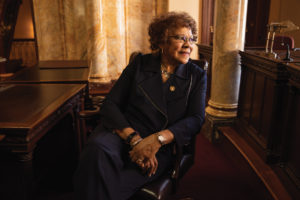 Shirley Turner ’64
Shirley Turner ’64
New Jersey Senate
Growing up poor and Black, Shirley Turner had it drilled into her head by her parents, neither of whom had made it past the eighth grade: She was going to earn a high school diploma. But along the way, she would have to outperform her classmates.
“Because of my race, I had to be twice as good,” Turner recalls.
By the time she graduated from Dover High School, Turner had played on the basketball, softball, hockey, and rifle teams, served in student government, and was senior class president.
“I was overly involved,” she says, fueled by determination that powered her into and through Trenton State. There, as one of 19 Black students, “we all knew each other; we were like a support system.” She held down two jobs en route to a degree in health and physical education: collecting dirty trays from the “slop chute” in the college’s cafeteria and waitressing off campus on weekends.
Across her more than five decades, the unmistakable through line of Turner’s career has been education.
“Education is the great equalizer in this society,” she says. “Had I not had that opportunity, I never would have achieved middle-class status.”
Turner worked for 44 years for Rider University as a counselor while serving as a Mercer County Commissioner, then a state assemblywoman, and for the past 24 years, a member of the state senate. Now vice-chair of the chamber’s Education Committee, her record includes innumerable efforts to enhance schooling and skills training, end the pipeline to prison, and help the incarcerated stay out upon release by expanding their minds.
“My thrust ever since I was elected to office has been to provide those kinds of opportunities to everybody, no matter what their economic status or zip code, from K to 12 and beyond,” she says. “My attitude is that if I can do it, anybody can do it if they have the same opportunities I had.”
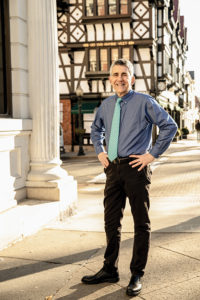 Mark Freda ’82
Mark Freda ’82
Mayor, Princeton, New Jersey
After 13 years on the Princeton council, Mark Freda stepped away from politics in 1999. With a job in New York City and two kids at home, it had become too much.
But two decades later, Freda says he saw what he perceived to be “some shortcomings in the way decisions were being made” about emergency services. As a lifelong borough resident who’d joined the fire department at age 18, that chafed him.
“I thought, ‘do I moan and groan, or do something about it?’” he says. With his kids grown and the commute a thing of the past, he ran again in 2020, this time for mayor, and won a four-year term.
Bringing a fresh perspective on the relationship between municipal government and residents, Freda has embraced new levels of transparency, posting regularly on social media and hosting a podcast about local people and goings-on, shedding light on grassroots efforts to advance affordable housing, the arts, LGBTQ issues, and more.
But still, there’s nothing like the one-on-one connections he gets to experience with community members, he says, though adjustments may be needed for lengthy, unscheduled discussions. “I’ve learned when I’m grocery shopping not to pick up anything perishable until the last minute,” he says, “because you never know what aisle you’re going to get stopped in.”
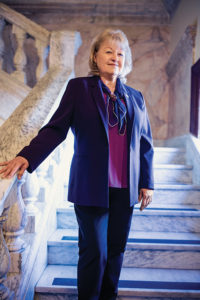 Jean Stanfield ’84
Jean Stanfield ’84
New Jersey Senate
Jean Stanfield was so shy that she dropped out of Trenton State College for a semester rather than fulfill a public speaking requirement for graduation.
Though she was already married and a mother twice over, “I remember being terrified,” she says. She returned when the requirement was changed to allow group discussion because “I was better at talking in small groups,” she says.
Stanfield is reticent no more. You don’t serve 18 years as Burlington County sheriff, win election to the state assembly, and then move up to the state Senate, as she did earlier this year, as a mouse.
“Over the years, I got over my public speaking issues,” Stanfield says. “I’ll never be the kind of person who loves being up at the podium, but I do it.”
A daughter of educators who met as students at Trenton State, Stanfield absorbed the lesson at the kitchen table that “you do what you can to serve,” she says. And throughout her career, as a mother of biracial children, she has been a champion of civil rights in areas of employment and criminal justice.
Still, when George Floyd was killed in 2020, Stanfield found, after some self-reflection and “several long talks with my son,” that she had not been using her voice as fully as possible. And she publicly owned up to it.
“I had to confront a very uncomfortable reality about myself,” she wrote in an op-ed. “I totally dropped the ball and did not do the most important thing I could do, which was to speak out loudly and clearly, each and every time, I heard someone make a statement that showed their implicit bias.”
She pledged “to speak up, because when people believe these things and their thoughts go unquestioned, they accumulate over time and lead to a feeling of superiority and entitlement,” she wrote.
Stanfield is also a co-sponsor of a proposed constitutional amendment to guarantee environmental rights for all, in recognition of the reality that “particularly in urban areas and lower-income areas, people don’t always have the same quality of air and water that we have in other areas of the state.”
“Those issues are important to me, that everybody has opportunities, everybody gets treated the same,” she says.
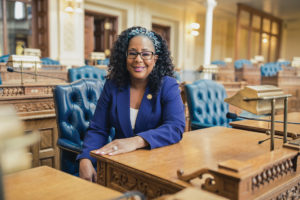 Verlina Reynolds-Jackson ’94
Verlina Reynolds-Jackson ’94
New Jersey General Assembly
A “super-auntie,” Verlina Reynolds-Jackson was early in her career as a social worker in her home city of Trenton when she temporarily became a foster parent to the children of relatives suffering from mental health challenges.
“I was single one day and the single parent of four the next day,” she says. “It was traumatic.”
One of the kids was being bullied and was afraid to make the short walk home from school. After school arrangements and other services were needed for all four. To top things off, Reynolds-Jackson’s car broke down, and she found herself “with a 3-year-old on my hip, waiting for a bus, trying to make these calls.”
She was fortunate, she says, that she knew how to navigate bureaucracies, “but it kept gnawing at me” that not every parent in a similar situation would know who to call, let alone have the time to be persistent while trying to create a loving atmosphere. The lack of advocacy at the local level fueled her passion to be a public servant and in 2010 she was elected to Trenton’s East Ward seat.
Seven years later, she successfully ran for state assembly, taking the District 15 seat previously held by fellow TCNJ alumna and state senator Shirley K. Turner ’64, whom she calls “a great mentor.”
“This was never in my plan. I was a social worker just trying to help people,” Reynolds-Jackson says. Now, she views herself as a “connector to opportunity” between residents and government resources, aided by another TCNJ alum, her chief of staff, Ed Gittens ’85.
And from her office on West State Street, she says proudly, “I can see the back door of my mother’s house. It reminds me every day to never forget,” she says, “that to whom much is given, much is required.”
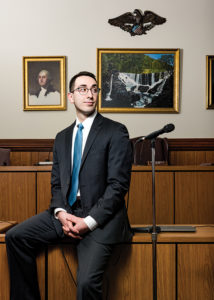 Freddie Hayeck ’22
Freddie Hayeck ’22
Councilman, Watchung Borough, New Jersey
Idly poking around his school district’s website while procrastinating on his homework one night his senior year of high school, Freddie Hayeck learned of an upcoming election for an open school board seat. So he decided to run for it, and won, just days after his 18th birthday, becoming the youngest-ever electee in New Jersey history.
But it wasn’t as impulsive as that. In fact, Hayeck appears lab-designed for involvement. As an Eagle Scout, he’d participated in American Legion Boys State, and was president of his class at the time of his election. He also was, and still is, a volunteer firefighter and first aid squad member.
“As far as my personal brand, I would say that service has always been a part of my life,” he says.
In early spring 2022, Hayeck was wrapping up his studies as a business administration major, completing his 300-hour commitment to AmeriCorps, working full time at a Trenton lobbying firm, responding to fire alarms and accident calls, and attending meetings of the Watchung Borough council, to which he was elected in 2020. Did we mention that?
Hayeck admits there was a moment when he was tempted “to just stop being involved in or follow politics” because of the rancor at the national level. But he says he instead felt even more drawn to local government because of its ability to actually solve problems.
“When you’re talking about where to put a recycled book drop-off, or what type of trees we’re going to plant, or looking for grant monies to help address environmental issues, that’s all that matters,” he says. “We’re just talking about the issues.”
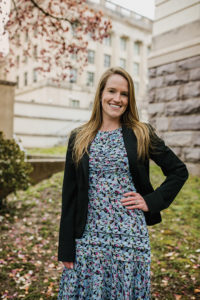 Katie Nestor Comanto ’12
Katie Nestor Comanto ’12
New Jersey deputy secretary of higher education
Since her first semester at TCNJ, Katie Comanto’s life journey has included a number of course corrections.
Picturing a career in medicine, she began as a science major, an idea that lasted “about 12 weeks,” she says. So she switched her major to psychology. But by senior year, she had drifted toward law, having decided to follow in her father’s footsteps. And after earning her JD from Seton Hall Law, she landed a job with a firm with a niche specialty: representing school boards.
None of it was expected — least of all, her two most recent twists: getting tapped to serve as Counsel to New Jersey Governor Phil Murphy on education law in the “havoc” of the pandemic, and, since early this year, her current job as New Jersey’s deputy secretary of higher education.
“As an undergrad, I would have never predicted I’d be in this role today,” she says. “My working hours are now spent directly impacting the lives of people across the state.”
Her contemporaries might recognize her as Katie Nestor, who won a NCAA designation as an All-American cross-country and track-and-field athlete. As a “proud product of New Jersey schools,” Comanto still works out problems while running, now focused on somewhat arcane issues, such as licenses for colleges and universities seeking to expand. But always in the background, she says, is an awareness that “higher education is so determinative about where your life can go.”
Lynn Azarchi ’98
Acting director of the New Jersey Office of Management and Budget
Born to serve: Been in OMB for 22 years.
Good trouble: During the pandemic, when so many people lost jobs and were living in fear, having their lives turned upside down, I was proud to be a part of New Jersey’s recovery effort directing a budget that helped those most in need.
Marita Sciarrotta ’89
Deputy director, New Jersey Division of Taxation
Paying her dues: Money we collect helps to pay for lights on our streets, incubators in neonatal clinics, parks and recreational areas, housing, and education.
Part of the whole: Government is a behemoth institution. But it’s the people, the individuals, the public servants, that are it.
Adriana Yunes ’22
Outreach aide for Assemblywoman Sadaf Jaffer
Why she serves: I grew up in Newark, where education is disproportionately funded compared to other New Jersey districts. I want to help communities where people face significant obstacles.
Taking cues: I learned from Assemblywoman Jaffer the importance of having diverse voices in these spaces.
Daniel Hurley ’19
Intern, U.S. Department of State
Good day on the Hill: Prepared materials for Secretary of State Antony Blinken to use in a meeting.
Briefing room: People have the power to change what they do not like about government. Skepticism should fuel engagement with government, not disengagement.
Madina Ouedraogo ’18
Policy coordinator for the Office of Governor Phil Murphy
Her causes: Gender equity and racial justice.
Her reason: To progress policy reforms to help marginalized communities.
Al Ribeiro ’02
Councilman, Bernardsville, New Jersey
Key issues: Revitalizing downtown and upgrading infrastructure and emergency preparedness.
Also seen around town: Worked on John McCain’s presidential campaign.
Stump speech: Focus on the community immediately around you. It will restore your faith in the positive impact that leadership can have.
Pictures: Bill Cardoni/Mike Morgan/Peter Murphy
Header image: Mihai Andritoiu/Shutterstock
Posted on May 26, 2022

